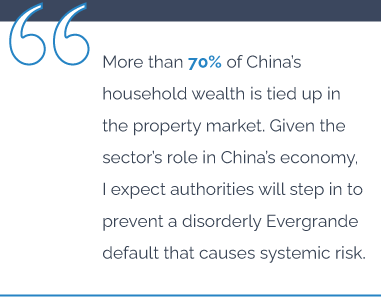The financial troubles of China Evergrande Group, China’s second-largest property developer, have put market participants on edge. Recently tightened financial restrictions have propelled the highly levered company into a liquidity crisis and it’s at risk of default. Given the company’s size, many investors are worried that its problems could lead to system-wide financial pain in China, with potential ripple effects across the global economy.
In my view, the situation is testing China’s balancing act between financial de-risking and preventing systemic financial risk. Remember, the Chinese government’s policy goal is to reduce leverage and mitigate risks to the financial system. On one hand, allowing Evergrande to suffer the consequences of its risk-taking behavior would send an important message to the market about curbing excessive debt and “moral hazards.” On the other hand, the size and interconnected nature of Evergrande’s debt means that a default could have potential knock-on effects throughout the economy. With the 20th Communist Party Congress just over a year away, I believe the government will move decisively to prevent a crisis and ensure growth remains on track in 2022.
Below, I share my thoughts on how China might handle this balancing act and what could go wrong.
A disorderly Evergrande default seems unlikely
In my opinion, the Chinese government does not view Evergrande as “too big to fail,” and a full government bailout is unlikely. However, I do think the government views the property sector as “too big to fail.” More than 70% of China’s household wealth is tied up in the property market.[i] Given the sector’s role in China’s economy, I expect authorities will step in to prevent a disorderly Evergrande default that causes systemic risk.
I think the most likely outcome for Evergrande is a controlled debt restructuring with some government intervention. In this scenario, authorities would establish a creditor committee to help extend the maturity of the company’s debt obligations, reduce lending rates and provide support to stave off default. They would also call in some state-owned enterprises (SOEs) to complete Evergrande’s construction projects to maintain homebuyer confidence. In my view, this approach would allow the government to strike a balance between instilling market discipline and containing systemic risk.
What could go wrong?
I see two key events that could trigger more systemic risk:
- A sudden drop in homebuyer confidence. If Evergrande’s liquidity crisis were to disrupt its onshore operations, construction could grind to a halt and interrupt the delivery of pre-sold properties. In my view, that would put a significant dent in homebuyer confidence. A sharp decline in homebuyer confidence would cause national housing sales to plummet, choking off a key source of cashflow for property developers and likely spilling over into upstream industrials. With more than 25% of China’s GDP directly or indirectly related to the property sector, a slowdown in housing activity could have a huge impact on the economy in my view.
- Imminent default and panic sales, prompting Evergrande to massively scale down its property operations in China. If Evergrande were to initiate a fire sale of its existing property projects, this could lead to a broad devaluation of investments exposed to real estate. Further, because local governments often use land as collateral for bank loans, the asset quality of commercial banks could be called into question. In my view, this scenario could set off a chain reaction in the bond market and the banking sector.
Is China headed for an economic slowdown?
I believe so. With mass media coverage of Evergrande and an outlook for stagnant prices, I think new housing sales will slow. Sluggish housing sales could then erode prices at land sales auctions and undercut a major source of revenue for local authorities. Barring the worst-case scenario of a disorderly Evergrande default, I believe we are likely to see weaker demand growth in China for at least the next two quarters. I estimate fourth-quarter GDP at just above 4.5%. Under these circumstances, I believe the government could implement additional fiscal and monetary stimulus as soon as November or December.
What’s priced into the markets?
The markets generally appear to be pricing in an orderly unwind of Evergrande’s debt obligations. As of this writing, downward pricing pressure has been largely confined to China’s property sector. I do not think the markets have priced in a growth slowdown in China or how that might affect the global economy.
Time is of the essence
With each day that passes, I believe the knock-on risks associated with Evergrande grow. Investors have begun re-pricing credit risks among other Chinese property developers, increasing the already-high refinancing pressure on leveraged firms. In my view, Chinese authorities should act soon with carefully crafted assistance to contain the situation.
[i] Loomis Sayles estimate, as of 24 September 2021.
MALR027849
Reference to specific securities or holdings should not be considered recommendations for action by investors.
Market conditions are extremely fluid and change frequently.
This blog post is provided for informational purposes only and should not be construed as investment advice. Any opinions or forecasts contained herein reflect the
subjective judgments and assumptions of the authors only and do not necessarily reflect the views of Loomis, Sayles & Company, L.P. Information, including
that obtained from outside sources, is believed to be correct, but Loomis Sayles cannot guarantee its accuracy. This material cannot be copied, reproduced or
redistributed without authorization. This information is subject to change at any time without notice.




